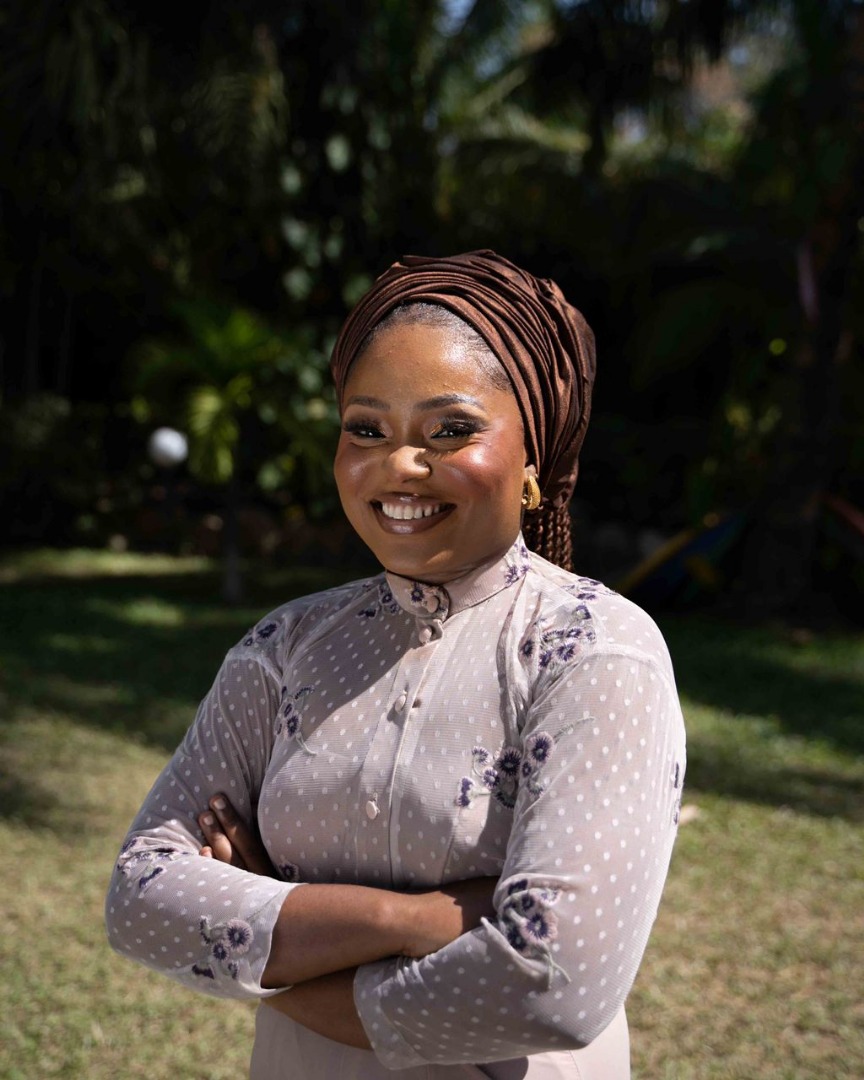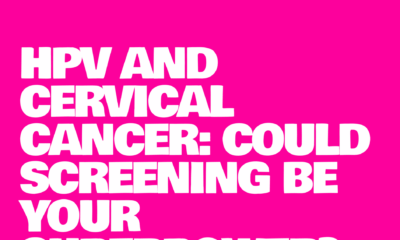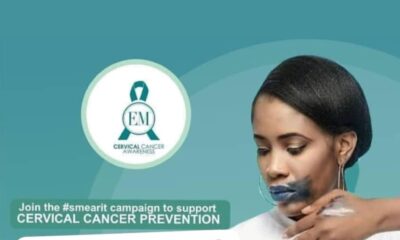Health
Pharm. Aishat Mohammed Sets the Record Straight on the HPV Vaccine & Cervical Cancer
As part of BellaNaija’s #StopHPVForHer campaign, Pharm. Aishat Mohammed of Medicaid is confronting myths about the HPV vaccine and encouraging parents to protect their daughters early.

Last September in Kaduna, Pharm Aishat Mohammed met a mother with a 13-year-old daughter. They got talking about health, and the conversation naturally turned to the HPV vaccine. The vaccine was free, available, and could protect the girl from cervical cancer for life. But when Pharm Aishat suggested she get her daughter vaccinated, the mother’s response was immediate: “I heard it causes infertility, so I refused.”
That single moment captures Nigeria’s cervical cancer crisis perfectly. The vaccine is free. Screening is available. Knowledge is spreading. Yet myths, fear, and misinformation are keeping Nigerian women and girls from the protection they need.
As part of BellaNaija’s #StopHPVForHer campaign, we spoke with Pharm Aishat Mohammed, Senior Programme Manager and Head of Pharmacy at Medicaid Cancer Foundation in Abuja. She’s a public health expert passionate about prevention, and she’s seen firsthand why cervical cancer remains a leading killer of Nigerian women despite being almost entirely preventable.
In this conversation, Pharm Aishat breaks down the facts: why 8 in 10 sexually active adults will contract HPV, how one dose of the vaccine offers 98% protection, when women should start screening, and why pharmacists are uniquely positioned to save lives. She also tackles the hard truths about why awareness hasn’t translated into action, and what it will really take to make cervical cancer a disease of the past.
You’ve worked across pharmacy, public health, and cancer care. What key lessons have you learned about the gaps in Nigeria’s approach to disease prevention, especially for HPV-related cancers like cervical cancer
One major gap is that our healthcare system still focuses more on treatment than prevention. Many interventions are reactive we wait for people to get sick before we act. In cancer care, this is especially costly because late-stage treatment is expensive and often less effective. We need to shift our mindset to community education, early screening, vaccination, and preventive policies. If prevention is made accessible, affordable, and part of everyday health habits, we’ll save countless lives and resources.
Cervical cancer is largely preventable, yet it remains one of the leading causes of cancer deaths among Nigerian women. From your experience, what’s driving this gap between prevention knowledge and actual prevention practice?
The gap exists because awareness hasn’t translated into behaviour change. Many women know about cervical cancer, but only a few act on that knowledge. Factors such as fear, cultural beliefs, stigma around reproductive health, and lack of access to screening centers all play a role. Some women think they don’t need screening because they feel fine, while others believe cancer is a death sentence. We must correct these misconceptions and make prevention a normal conversation in families and communities.
Regular cervical screening is a key part of prevention. Why is routine screening necessary, and what guidelines should women follow regarding when to start and how often to get tested?
Screening helps detect precancerous changes in the cervix long before symptoms appear. When caught early, these changes can be treated easily, preventing cancer altogether. Guidelines recommend:
- Women aged 25–49 should be screened every three years.
- Women 50 and above should screen every five years.
- Available tests include the Pap smear and the HPV test. Early detection can reduce cervical cancer deaths by up to 80% (it’s truly lifesaving.)
HPV is highly prevalent worldwide. From your public health perspective, why is it so common, and what factors contribute to widespread exposure among adults?
HPV (Human Papillomavirus) is extremely common, about 8 in 10 sexually active adults will have it at some point. It’s spread through skin-to-skin contact, not just intercourse, which makes it very easy to transmit. Most infections are harmless and clear up on their own. However, persistent infection with high-risk HPV types (especially 16 and 18) can lead to cervical and other cancers. Contributing factors include early sexual debut, multiple partners, poor genital hygiene, smoking, and weakened immunity.
The HPV vaccine is currently free for girls aged 9 to 14 in primary health centres across Nigeria. How significant is this vaccine for reducing cervical cancer risk?
This is one of the most important public health milestones for Nigeria. The HPV vaccine is safe, effective, and free for girls aged 9–14 years through government and donor support. It can prevent up to 70% of cervical cancer cases by targeting the most dangerous HPV types before girls become exposed. If we achieve high coverage, we can virtually eliminate cervical cancer within a generation.
The HPV vaccine targets specific strains linked to cervical cancer. Which strains does the one-dose vaccine in Nigeria cover, and what level of protection does this offer?
The current vaccine available in Nigeria targets HPV types 16 and 18 which are the two strains responsible for about 70% of cervical cancers. The great news is that the single dose now recommended by the World Health Organisation provides up to 98% protection against these strains. It’s a one-time shot with long-lasting benefits, making it both convenient and effective.
Despite HPV vaccination being available and effective, many Nigerians may not have heard about it. What do you think are the biggest barriers? cost, awareness, or something else?
Now that cost is no longer a barrier (since it’s free), awareness and misinformation are the biggest challenges. Many parents simply don’t know about the vaccine, or they fear it affects fertility (a typical example happened when I travelled to Kaduna in September for a health conference. I tried to encourage a woman to have her teenage daughter of 13 take the vaccine and her response was she heard it causes infertility so she refused) which is false. We need to build trust through community engagement, ensure schools participate in vaccination drives, and use pharmacists, health workers, and media platforms to spread the message. The more people hear accurate information, the faster we’ll change perceptions.
Pharmacists are often the most accessible health professionals for Nigerians, sometimes more than doctors. How can community pharmacists play a role in the fight against cervical cancer and other HPV-related cancers?
Pharmacists are in a unique position because we interact with people daily, sometimes more often than their doctors. We can use this access to educate clients about HPV, cervical screening, and vaccination, and dispel myths immediately. Pharmacies can also serve as information points, refer people to screening centres, and even collaborate with public health programs for community outreach. Our accessibility makes us powerful advocates in cancer prevention.
Beyond screening and vaccination, what role do lifestyle, nutrition, or community habits play in reducing cancer risk, especially for women?
Lifestyle choices have a huge impact. A diet rich in fruits, vegetables, and antioxidants, avoiding smoking, limiting alcohol, maintaining a healthy weight, and practicing safe sex all reduce cancer risk. Communities can also encourage regular health checks and normalise conversations about women’s health. “Small, consistent habits make a big difference in long-term prevention.”
Based on everything you’ve seen in cancer care, what message would you share with everyone reading this?
My message is simple: Cervical cancer is preventable. We have the tools: vaccination, screening, and education to eliminate it. I encourage parents to get their daughters vaccinated, and women to go for screening regularly. Let’s normalise prevention, not fear. If every Nigerian woman takes this step, we can make cervical cancer a disease of the past.
Quick Facts Nigerians Should Know
- Cervical cancer is the 2nd most common cancer among Nigerian women.
- HPV causes 99% of cervical cancer cases.
- 80% of women will contract HPV at least once.
- Screening every 3–5 years can prevent most cases.
- The HPV vaccine is free for girls aged 9–14.
- One dose = 98% protection against HPV 16 and 18.
- Early detection can cut deaths by 80%.
- Pharmacists can drive awareness and early action.
- Healthy living reduces cancer risk.
Cervical cancer is preventable, take action now!





















